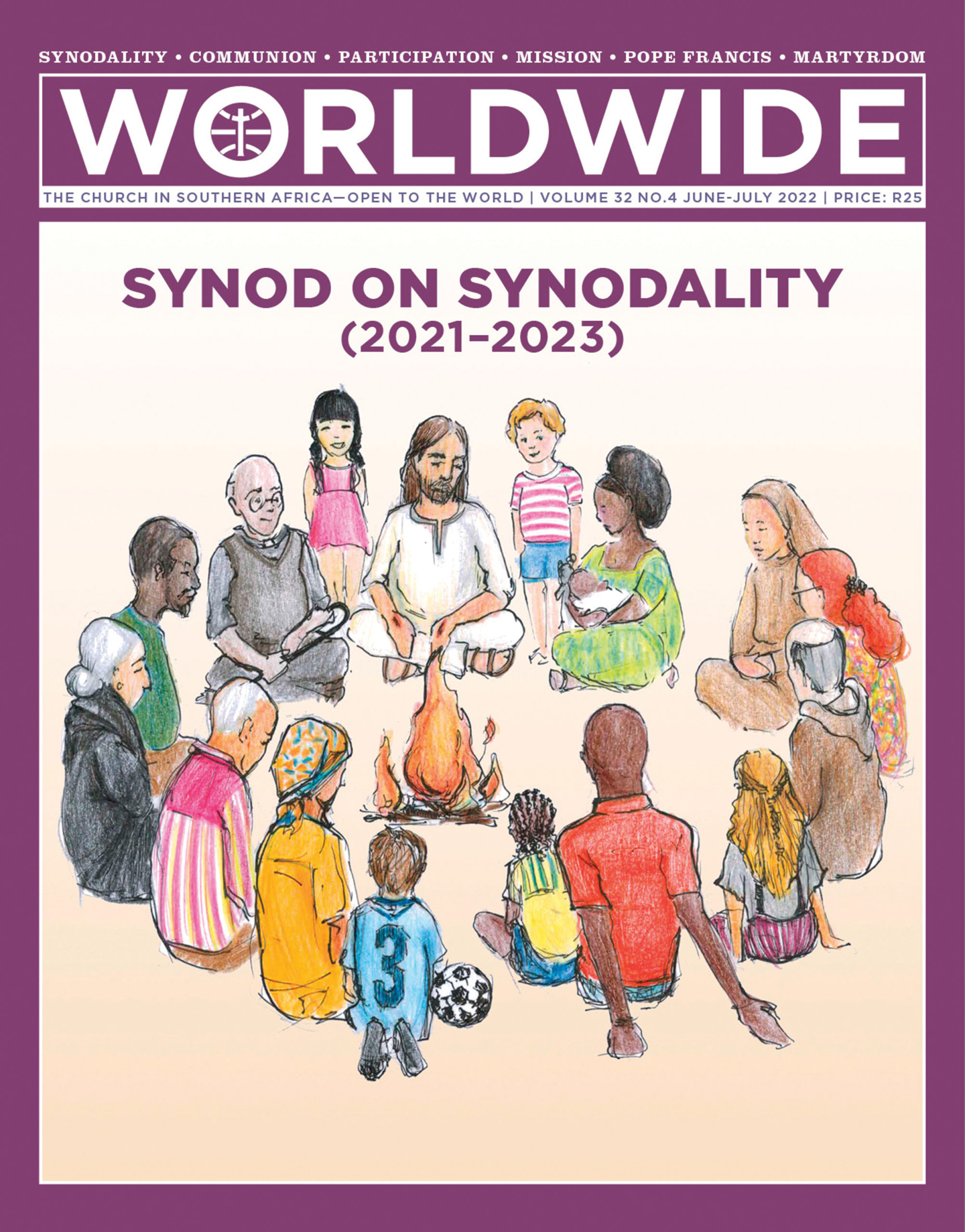
SYNOD ON SYNODALITY (2021–2023)
The cover illustration represents the exercise in which the Church is invited to engage in this process of synodality. Gathered by the Lord and guided by the Holy Spirit, through a journey of prayer, the people of God from all continents, representing diverse ages and kinds of lives, come together to listen to each other, including those marginalized, participating and reflecting on how to be transformed into an inclusive community sent to the mission in the world.
INSIGHTS • POWER vs PARTICIPATION

The Synod: are we really walking together?
BY MIKE POTHIER | PROGRAMME MANAGER, SACBC PARLIAMENTARY LIAISON OFFICE
DEMOCRACY OFTEN disappoints us. Whenever there’s an election, politicians emphasise that that ‘we are in this together’, that ‘we must be united in dealing with the challenges’, and so on. The message is all about togetherness—they will exercise the political power we give them strictly on our behalf, remaining accountable and responsive to our needs.
However, once they have been elected, much of this commitment evaporates. As we know all too well in South Africa, the real motivation of many, perhaps most, of our politicians is to get their hands on power and thereby soak up its benefits— patronage, status, influence, and ultimately wealth.
Notions of ‘togetherness’ vanish into thin air. When disaster strikes, as it did recently in KwaZulu-Natal, we are not surprised to see the emergency water tanker driving directly to the Premier’s house—the pretence that he is a servant of the people is quickly replaced by the truth: he is actually their Lord, first in line for relief. Thus is power abused in the political world.
These thoughts come to mind when thinking about the forthcoming Synod of our Church, due to culminate in October 2023. This particular Synod is intended to be far more participatory than previous ones, and the Preparatory Document is full of the language of participation and ‘journeying together’—this being the very meaning of the word ‘synod’.
The document also recognises that the question of power—and the abuse of power —is a problem in the Church. One of the Synod’s objectives will be to examine ‘how responsibility and power are lived in the Church as well as the structures by which they are managed, bringing to light and trying to convert prejudices and distorted practices that are not rooted in the Gospel’.
What is needed—in both politics and the Church—is a major change of attitude realities faced in the various moments of human history
We know, obviously, that the terrible history of sexual abuse by clergy and religious in our Church has its roots in twisted power relationships; and to their credit the Church’s leadership in some countries have begun to take this seriously. However, there are so many other abuses of power that are simply accepted as normal and unremarkable.
While preparing this article I heard of a priest who will not allow The Southern Cross, our national Catholic magazine, to be sold in ‘his’ parish; he expects people to buy it at the nearest Catholic bookshop, which is closed at the times when people come to Sunday Masses. Another priest refuses to give communion to some of his African parishioners because he believes that the beads they wear are ‘pagan’. From time to time we still hear stories of people being refused burial from their parishes because they or their families are behind in the payment of their church dues.
These attitudes, rather than the nice-sounding aspirations in the Synod Preparatory Document are, generally speaking, the reality in our Church, just as self-advancement and greed are the reality in our political world, rather than the promises of servant leadership. As it would be naïve to believe that the abuse of political power might be ended by having another election, it would also be naïve to think that holding a Synod, even one more participatory than usual, will end the abuse of power in the Church.
It is noticeable, for example, that the exclusion on purely biological grounds of more than half the Church’s membership—women—from the possibility of ordained ministry, and therefore from positions of meaningful authority, gets only a passing mention: the Preparatory Document claims that ‘the opening of access to [the ministries] of Lector and Acolyte’ to them are a move towards ‘a greater appreciation of women’. Clearly, there is a long way to go!
What is needed—in both politics and the Church—is a major change of attitude. There is, unfortunately, not much sign of that in our politics. In the governing party, in particular, loyalty to comrades is still far more important than loyalty to the values of the Constitution or to stated commitments that office-bearers should ‘step aside’ when credibly accused of breaking the law.
And in the Church? Will this synod be a breakthrough to a more participatory and accountable Church? Let us pray that it will be.
| Dates To Remember |
|
June 1 – Global Day of Parents 4 – International Day of Innocent Children Victims of Aggression 5 – Pentecost Sunday 5 – World Environment Day 8 – World Oceans Day 12 – World Day Against Child Labour 13 – International Albinism Awareness Day 15 – World Elder Abuse Awareness Day 16 – National Youth Day in South Africa 17 – World Day to Combat Desertification and Drought 19 – International Day for the Elimination of Sexual Violence in Conflict 20 – World Refugee Day 23 – International Widows’ Day 26 – International Day against Drug Abuse and Illicit Trafficking 27 – Micro, Small and Medium-sized Enterprises Day July 3 – International Day of Cooperatives 11 – World Population Day 15 – World Youth Skills Day 18 – Nelson Mandela International Day 24 – World Day of Prayer for Grandparents and the Elderly 30 – International Day of Friendship 30 – World Day against Trafficking in Persons |

Your house is valueble for me. Thanks!…